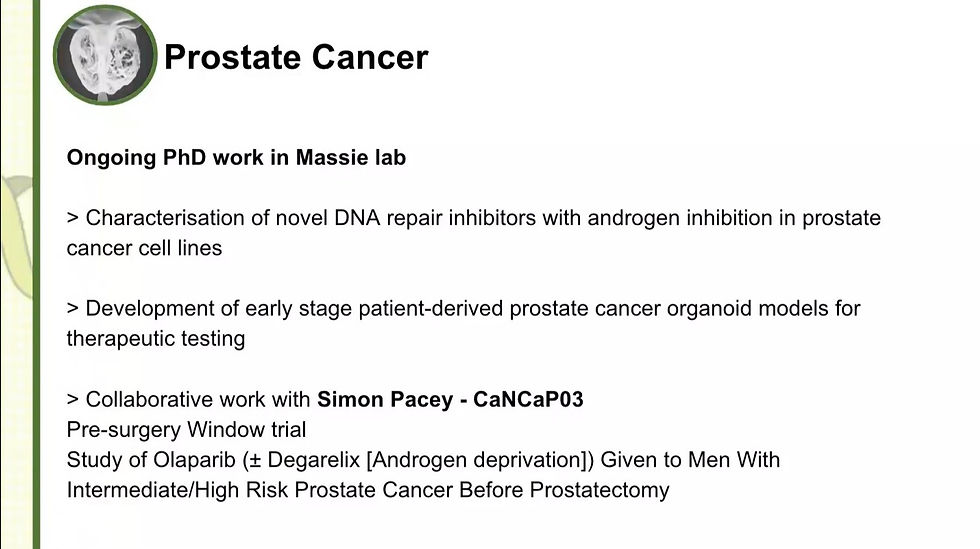'DNA Repair in Urological Malignancies' - a breakfast meeting with Robert Hanson
- Carley Batley

- May 6, 2021
- 3 min read
Robert Hanson, a PhD student in Charlie Massey's lab is studying prostate cancer and developing markers of response and resistance to DNA damage repair. After taking advantage of funding from our Travel and Training Award to attend the PARP & DDR inhibitors 2021 digital summit this January, Robert shared his research at our April Breakfast Meeting.
Robert opened his talk by introducing the topic of DNA damage, repair, and cell death through apoptosis. He explained how DNA damage is linked to the development of cancer, "We know that DNA damage yields mutations which can drive constant development if the damage is not repaired effectively and if cells harbour defects in DNA repair, this can predispose [patients to] cancer development." Classic anti-cancer treatments including radiotherapy and chemotherapy work by inflicting DNA damage to drive apoptosis in cancer cells. Evidence from clinic suggests to Robert that a patient's ability to repair DNA damage can "provide early predictors of how aggressive their tumour is, and how we they may respond to certain therapies."

Robert shared a figure summarising how different types of DNA damage occur and mechanisms for DNA repair. Explaining how these pathways might be utilised for the treatment of cancer: "if one repair pathway is defective and fails to repair the damage, another pathway could step in [...] if within a cancer cell a main repair pathway is defective we could then potentially go in with a drug which blocks a backup repair pathway and this can result in pushing the cell towards cell death as an anticancer strategy." PARP inhibitors were the first drugs developed to exploit these vulnerabilities.
PARP inhibitors are currently used in the treatment of ovarian, breast, prostate and pancreatic cancers. Researchers are exploring how the application of PARP inhibitors can be widened through combination with other therapies. Robert shared data showing that a number of DNA repair targeted therapies are advancing through trial and into the clinic, "it's a very exciting area to be in and a lot more progress is coming in the future."
We know that in prostate cancer, DNA repair defects are associated with early age onset, aggressive disease and poor prognosis. While androgen depravation therapeutics (ADTs) are the standard of care for prostate cancer, resistance to the drug can limit their efficacy. As androgen deprivation has been shown pre-clinically to modulate DNA repair, there is a rationale for using anti-hormonal agents to sensitize cells to PARP inhibition. Robert went on to summarise two phase III trials demonstrating the efficacy of therapies combining ADTs and PARP inhibitors for patients with certain gene mutations. However, the mechanism by which this works is still unclear, and untangling this is part of Robert's PhD research. He went on to share data suggesting that this drug combination has a synergistic, rather than just additive, effect.

Robert shared the outcomes of research on DNA damage response (DDR) and kidney cancer, including a study showing DDR pathway alteration in 25% of localised clear cell renal cancer cases, and its association with poorer outcomes for patients with locally advanced T3-4 disease.
Biallelic mutation of the VHL gene is observed in over 80% of clear cell kidney cancer patients. Robert said, "taken together, data suggests that VHL1 loss can induce DNA damage related stress", rendering VHL loss cells more reliant on DNA repair pathway components for survival than VHL+ cells. This is a rationale for testing targeted DNA repair therapies for treating kidney cancer.
Urological Malignancies Programme Leads Dr Sarah Welsh and Professor Grant Stewart are leading exploratory work using different types and combinations of drug therapies, including Olaparib, a PARP inhibitor, to treat kidney cancer before surgery. The WIRE trial aims to find biomarkers to identify which patients will respond to which drug or drug combination, using a functional DNA repair assay. Robert shared data from a 2018 study showing a correlation between PARP inhibitor response in patients with breast cancer and the absence of a biomarker for homologous recombination (HR - a mechanism of DNA repair) competence - suggesting that patients with HR deficiency are more likely to respond to treatment with a PARP inhibitor.
You can see Robert's full talk with presentation on the UM Teams channel. Follow him on Twitter @RobertHanson105.



Comments